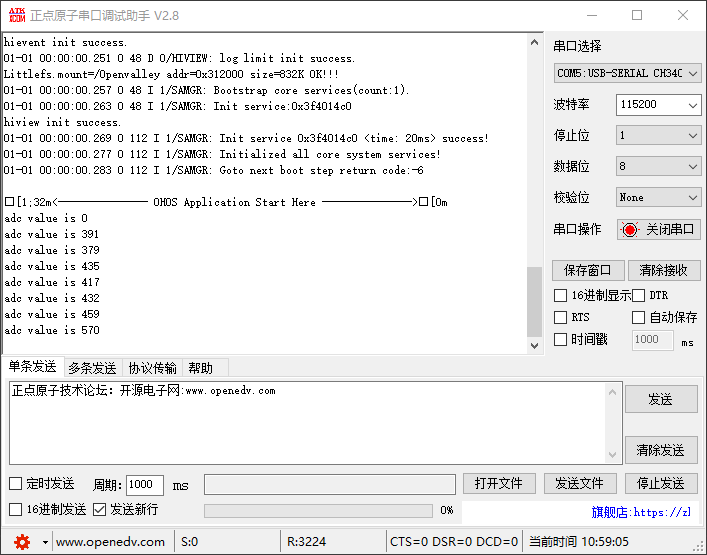spdlog

Loggers:是 Spdlog 最基本的组件,负责记录日志消息。在 Spdlog 中,一个 Logger 对象代表着一个日志记录器,应用程序可以使用 Logger 对象记录不同级别的日志消息Sinks:决定了日志消息的输出位置。在 Spdlog 中,一个 Sink 对象代表着一个输出位置,例如控制台、文件、网络等。应用程序可以将不同的日志消息发送到不同的 Sink 中Formatters:负责将日志消息转换为特定格式。在 Spdlog 中,一个 Formatter 对象代表着一个消息格式器,应用程序可以使用不同的 Formatter 对象将日志消息转换为不同的格式Async Logger:是 Spdlog 的异步记录器,它负责将日志消息异步地写入到目标 Sink 中。当应用程序调用 Logger 对象记录一个日志消息时,该消息会被加入到一个队列中,然后异步地写入目标 Sink 中。这样可以避免多个线程同时访问 Sink,从而确保线程安全性Registry:用于管理 Spdlog 的所有组件。在 Spdlog 中,所有的 Loggers、Sinks、Formatters 和 Async Logger 都在一个全局注册表中注册,Registry 用于管理这些组件
spdlog 记录日志的流程
当应用程序调用spdlog 记录日志时,spdlog 的调用流程如下:
- 获取一个 Logger 对象
- 使用该 Logger 对象记录一个日志消息,该消息包括日志级别、时间戳、线程 ID、文件名和行号等信息
- 将日志消息传递给 Formatter,将消息转换为特定格式
- 将格式化后的消息传递给 Async Logger
- Async Logger 将消息写入目标 Sink,完成日志记录。
源码结构
.
├── CMakeLists.txt
├── bench
├── cmake
├── example
│ ├── CMakeLists.txt
│ └── example.cpp
├── include
│ └── spdlog
│ ├── async.h // *.h 异步模式,日志库接口等实现
│ ├── async_logger-inl.h
│ ├── async_logger.h
│ ├── cfg
│ ├── common-inl.h
│ ├── common.h
│ ├── details // 功能函数目录
│ │ ├── registry-inl.h
│ │ ├── registry.h // 管理所有logger的获取、创建、销毁等
│ │ ├── mpmc_blocking_q.h // 多生产多消费者队列
│ │ ├── circular_q.h // 循环队列
│ │ ├── thread_pool-inl.h
│ │ ├── thread_pool.h // 线程池
│ │ └── synchronous_factory.h
│ ├── fmt // {fmt} 库目录
│ ├── formatter.h
│ ├── fwd.h
│ ├── logger-inl.h
│ ├── logger.h
│ ├── mdc.h
│ ├── pattern_formatter-inl.h
│ ├── pattern_formatter.h
│ ├── sinks // 落地文件格式实现
│ │ ├── android_sink.h
│ │ ├── ansicolor_sink-inl.h
│ │ ├── ansicolor_sink.h
│ │ ├── base_sink-inl.h
│ │ ├── base_sink.h
│ │ ├── basic_file_sink-inl.h
│ │ ├── basic_file_sink.h
│ │ ├── callback_sink.h
│ │ ├── daily_file_sink.h
│ │ ├── dist_sink.h
│ │ ├── dup_filter_sink.h
│ │ ├── hourly_file_sink.h
│ │ ├── kafka_sink.h
│ │ ├── mongo_sink.h
│ │ ├── msvc_sink.h
│ │ ├── null_sink.h
│ │ ├── ostream_sink.h
│ │ ├── qt_sinks.h
│ │ ├── ringbuffer_sink.h
│ │ ├── rotating_file_sink-inl.h
│ │ ├── rotating_file_sink.h
│ │ ├── sink-inl.h
│ │ ├── sink.h // 所有sink的基类
│ │ ├── stdout_color_sinks-inl.h
│ │ ├── stdout_color_sinks.h
│ │ ├── stdout_sinks-inl.h
│ │ ├── stdout_sinks.h
│ │ ├── syslog_sink.h
│ │ ├── systemd_sink.h
│ │ ├── tcp_sink.h
│ │ ├── udp_sink.h
│ │ ├── win_eventlog_sink.h
│ │ ├── wincolor_sink-inl.h
│ │ └── wincolor_sink.h
│ ├── spdlog-inl.h
│ ├── spdlog.h
│ ├── stopwatch.h
│ ├── tweakme.h
│ └── version.h
├── src
│ ├── async.cpp // .cpp 文件,组成编译模块生成静态库使用
│ ├── bundled_fmtlib_format.cpp
│ ├── cfg.cpp
│ ├── color_sinks.cpp
│ ├── file_sinks.cpp
│ ├── spdlog.cpp
│ └── stdout_sinks.cpp
└── tests // 测试代码
其中:
spdlog/spdlog.h为日志库接口,提供日志宏的属性控制函数spdlog/logger.h为日志管理器,为前后端连接的枢纽spdlog/async.h为异步模式接口spdlog/sinks/base_sink.h为日志文件格式基类,后面所有的日志文件格式都是继承该类来实现不同功能spdlog/sinks/registry.h用于注册所有的logger,及一些默认的属性,如日志格式、日志写入等级
spdlog编译方式
spdlog的源码被分在xxx.h和xxx-inl.h文件中,其中xxx.h只有函数和类的声明,而实现都以inline的方式写在了xxx-inl.h中。spdlog提供了header-only version和compiled version2种方式, 通过SPDLOG_HEADER_ONLY宏定义,可以调节.h文件中是否包含了其实现的代码,如果包含了那就是header-only version。如果不包含,那它就是compiled version中普通的头文件。如果是compiled version形式,则其源码中包含xxx-inl.h实现就可以了。SPDLOG_COMPILED_LIB和SPDLOG_HEADER_ONLY宏定义:
// spdlog/common.h
#ifdef SPDLOG_COMPILED_LIB#undef SPDLOG_HEADER_ONLY#define SPDLOG_INLINE
#else // !defined(SPDLOG_COMPILED_LIB)#define SPDLOG_API#define SPDLOG_HEADER_ONLY#define SPDLOG_INLINE inline
#endif // #ifdef SPDLOG_COMPILED_LIB
// async.cpp
#ifndef SPDLOG_COMPILED_LIB#error Please define SPDLOG_COMPILED_LIB to compile this file.
#endif#include <spdlog/async.h> // 正常async头文件,包含类和接口声明
// xxx-inl.h 具体实现
#include <spdlog/async_logger-inl.h>
#include <spdlog/details/periodic_worker-inl.h>
#include <spdlog/details/thread_pool-inl.h>// cfg.cpp
#ifndef SPDLOG_COMPILED_LIB#error Please define SPDLOG_COMPILED_LIB to compile this file.
#endif
#include <spdlog/cfg/helpers-inl.h>
spdlog 接口
spdlog::debug(), 默认的日志对象,使用默认的日志信息格式,输出至 stdoutlogger->debug(), 指定日志对象进行日志记录,输出至该日志对象对应的文件中SPDLOG_LOGGER_DEBUG(logger), SPDLOG_DEBUG(), 使用宏对以上两种接口进行包装,产生的日志格式包含 文件、函数、行- 支持的文件类型:
- 标准输出
- 带颜色的标准输出(默认)
- 基本文件
- 可设定时间的滚动文件
- 可设定大小的滚动文件
- 过滤重复的日志
- syslog 日志
- 支持的文件类型:
spdlog 默认使用同步模式,也可以设置异步模式,异步模式会创建一个线程池,线程池大小可以自行设置,默认为1,该线程池所有者为 details::registry::instance(). 后台的大小可以设置的 多生产者多消费者队列 默认为阻塞模式,也可以设置为非阻塞。
sync-logger 的调用过程
// 调用例如spdlog::info("Welcome to spdlog!");
// 或者spdlog::info(num);
template <typename T> void info(const T &msg)
{ log(level::info, msg); } // 1. 确定log等级为info// 调用例如spdlog::info("Support for floats {:03.2f}", 1.23456);
// 或者spdlog::info("Positional args are {1} {0}..", "too", "supported");
template <typename... Args> void info(format_string_t<Args...> fmt, Args &&...args)
{ log(level::info, fmt, std::forward<Args>(args)...); } // 1. 确定log等级为infotemplate <typename T> void log(level::level_enum lvl, const T &msg)
{ log(source_loc{}, lvl, msg); } // 2. 确定日志调用的位置(文件、函数名、行号)template <typename... Args>
void log(level::level_enum lvl, format_string_t<Args...> fmt, Args &&...args)
{ log(source_loc{}, lvl, fmt, std::forward<Args>(args)...); } // 2. 确定日志调用的位置(文件、函数名、行号)template <typename T> void log(source_loc loc, level::level_enum lvl, const T &msg)
{ log(loc, lvl, "{}", msg); } // spdlog::info(num);可以等价为spdlog::info("{}", num);这里加了一个“{}”template <typename... Args>
void log(source_loc loc, level::level_enum lvl, format_string_t<Args...> fmt, Args &&...args)
{ log_(loc, lvl, details::to_string_view(fmt), std::forward<Args>(args)...); } // 3. log_日志输出// 4.
template <typename... Args>
void log_(source_loc loc, level::level_enum lvl, string_view_t fmt, Args &&...args) {bool log_enabled = should_log(lvl); // 是否需要记录日志bool traceback_enabled = tracer_.enabled(); // 是否需要tracebackif (!log_enabled && !traceback_enabled) { return; } memory_buf_t buf;// 使用第三方的fmt库做格式化,例如将("num {:.2f}", 1.23456) 格式化成 "num 1.23"fmt::vformat_to(fmt::appender(buf), fmt, fmt::make_format_args(args...));details::log_msg log_msg(loc, name_, lvl, string_view_t(buf.data(), buf.size()));// log_it_(log_msg, log_enabled, traceback_enabled);
}// 5.
void logger::log_it_(const spdlog::details::log_msg &log_msg,bool log_enabled,bool traceback_enabled) {if (log_enabled) { sink_it_(log_msg); }if (traceback_enabled) { tracer_.push_back(log_msg); }
}
// 6.
void logger::sink_it_(const details::log_msg &msg) {// 遍历sinks_中的所有sink并把msg交给每个sink去处理for (auto &sink : sinks_) {if (sink->should_log(msg.level)) { sink->log(msg); }}// should_flush_: 通过判断msg的等级和flush_level_的关系来决定是不是立即将msg写到文件或终端if (should_flush_(msg)) { flush_(); }
}
// 7. 让所有sink都进行一次flush操作
void logger::flush_() {for (auto &sink : sinks_) { sink->flush(); // 将缓冲区的内容进一步写入到文件或者控制台等最终目的地}
}
async-logger 的调用过程
async-logger的代码在asyn_logger.h和async_looger-inl.h中,对应async_logger类。async_logger继承自logger,前面关于接受日志内容整理log_msg对象中的工作照常做,将对sink的调用(包括sink->log(msg)和sink->flush())都交由线程池去执行了,由此便实现了异步。代码如下:
void spdlog::async_logger::sink_it_(const details::log_msg &msg)
{if (auto pool_ptr = thread_pool_.lock()) {pool_ptr->post_log(shared_from_this(), msg, overflow_policy_);}else {throw_spdlog_ex("async log: thread pool doesn't exist anymore");}
}
// thread_pool_ 的声明
std::weak_ptr<details::thread_pool> thread_pool_;
线程池里面要有一个多生产多消费的线程安全队列,用来存放日志内容。可以有多个async_logger(即生产者)向里面生产日志,又同时又多个线程(即消费者)从里面消费日志。这个队列的容量应该是有限的,当队列满了之后向里面生产日志可以有不同的策略,spdlog提供了三种策略:阻塞、丢弃新日志和丢弃旧日志。为方便实现这个需求,用循环队列来实现。
循环队列
循环队列的代码在circular_q.h中实现:
circular_q应设计成类模板,使其能够支持各种数据类型;- circular_q中实际存数据的
std::vector<T> vec_的大小应该比circular_q能存的数据大小多一个,这样才能队列是满的还是空的
多生产多消费的线程安全队列
template <typename T>
class mpmc_blocking_queue {...// try to enqueue and block if no room leftvoid enqueue(T &&item) {std::unique_lock<std::mutex> lock(queue_mutex_);pop_cv_.wait(lock, [this] { return !this->q_.full(); }); // 阻塞式等待,直到q_非满状态q_.push_back(std::move(item));push_cv_.notify_one();}// blocking dequeue without a timeout.void dequeue(T &popped_item) {std::unique_lock<std::mutex> lock(queue_mutex_);push_cv_.wait(lock, [this] { return !this->q_.empty(); }); // 阻塞式等待popped_item = std::move(q_.front());q_.pop_front();pop_cv_.notify_one();}private:std::mutex queue_mutex_;std::condition_variable push_cv_;std::condition_variable pop_cv_;spdlog::details::circular_q<T> q_;std::atomic<size_t> discard_counter_{0};
}
spdlog线程池
thread_pool使用了mpmc_blocking_queue(多生产者-多消费者阻塞队列)来缓存日志消息。这个队列允许多个前端线程(生产者)同时向队列中添加日志消息,也允许多个后端线程(消费者)同时从队列中取出消息。前端线程是指用户调用日志记录功能的线程。当用户调用异步日志记录方法时,日志消息会被封装成 async_msg 对象,并放入 mpmc_blocking_queue 队列中。thread_pool 内部维护了一组后端线程,这些线程从 mpmc_blocking_queue 队列中取出日志消息并进行处理。实际上是调用 async_logger::backend_sink_it_ 方法,将日志消息写入到预先注册的 sink(日志输出目标,如文件、控制台等)
SPDLOG_INLINE thread_pool::thread_pool(size_t q_max_items,size_t threads_n,std::function<void()> on_thread_start,std::function<void()> on_thread_stop): q_(q_max_items) {if (threads_n == 0 || threads_n > 1000) {throw_spdlog_ex("spdlog::thread_pool(): invalid threads_n param (valid range is 1-1000)");}for (size_t i = 0; i < threads_n; i++) {threads_.emplace_back([this, on_thread_start, on_thread_stop] {on_thread_start();this->thread_pool::worker_loop_();on_thread_stop();});}
}
SPDLOG_INLINE thread_pool::thread_pool(size_t q_max_items,size_t threads_n,std::function<void()> on_thread_start): thread_pool(q_max_items, threads_n, on_thread_start, [] {}) {}
SPDLOG_INLINE thread_pool::thread_pool(size_t q_max_items, size_t threads_n): thread_pool(q_max_items, threads_n, [] {}, [] {}) {}void SPDLOG_INLINE thread_pool::worker_loop_() {while (process_next_msg_()) {}
}// process next message in the queue, return true if this thread should
// still be active (while no terminate msg was received)
bool SPDLOG_INLINE thread_pool::process_next_msg_() {async_msg incoming_async_msg;q_.dequeue(incoming_async_msg);switch (incoming_async_msg.msg_type) {case async_msg_type::log: {incoming_async_msg.worker_ptr->backend_sink_it_(incoming_async_msg);return true;}case async_msg_type::flush: {incoming_async_msg.worker_ptr->backend_flush_();incoming_async_msg.flush_promise.set_value();return true;}case async_msg_type::terminate: {return false;}default: {assert(false);}}return true;
}std::future<void> SPDLOG_INLINE thread_pool::post_flush(async_logger_ptr &&worker_ptr,async_overflow_policy overflow_policy) {std::promise<void> promise;std::future<void> future = promise.get_future();post_async_msg_(async_msg(std::move(worker_ptr), async_msg_type::flush, std::move(promise)), overflow_policy);return future;
}
void SPDLOG_INLINE thread_pool::post_async_msg_(async_msg &&new_msg, async_overflow_policy overflow_policy) {if (overflow_policy == async_overflow_policy::block) {q_.enqueue(std::move(new_msg));} else if (overflow_policy == async_overflow_policy::overrun_oldest) {q_.enqueue_nowait(std::move(new_msg));} else {assert(overflow_policy == async_overflow_policy::discard_new);q_.enqueue_if_have_room(std::move(new_msg));}
}
spdlog sink
sink接收log_msg对象,并通过formatter将对象中所含有的信息转换成字符串,最后将字符串输出到指定的地方,例如控制台、文件等,甚至通过tcp/udp将字符串发送到指定的地方
sink 类图
源码剖析
logger factory
// synchronous_factory.h
// Default logger factory- creates synchronous loggers
struct synchronous_factory {template <typename Sink, typename... SinkArgs>static std::shared_ptr<spdlog::logger> create(std::string logger_name, SinkArgs &&...args) {auto sink = std::make_shared<Sink>(std::forward<SinkArgs>(args)...);auto new_logger = std::make_shared<spdlog::logger>(std::move(logger_name), std::move(sink));details::registry::instance().initialize_logger(new_logger);return new_logger;}
};// stdout_sinks factory
template <typename Factory = spdlog::synchronous_factory>
std::shared_ptr<logger> stdout_logger_mt(const std::string &logger_name);template <typename Factory = spdlog::synchronous_factory>
std::shared_ptr<logger> stdout_logger_st(const std::string &logger_name);template <typename Factory = spdlog::synchronous_factory>
std::shared_ptr<logger> stderr_logger_mt(const std::string &logger_name);template <typename Factory = spdlog::synchronous_factory>
std::shared_ptr<logger> stderr_logger_st(const std::string &logger_name);// stdout_color_sinks
// stdout_color_mt: 多线程(mult thread) stdout_color_st: 单线程(single thread)
template <typename Factory>
SPDLOG_INLINE std::shared_ptr<logger> stdout_color_mt(const std::string &logger_name, color_mode mode) {return Factory::template create<sinks::stdout_color_sink_mt>(logger_name, mode);
}template <typename Factory>
SPDLOG_INLINE std::shared_ptr<logger> stdout_color_st(const std::string &logger_name, color_mode mode) {return Factory::template create<sinks::stdout_color_sink_st>(logger_name, mode);
}template <typename Factory>
SPDLOG_INLINE std::shared_ptr<logger> stderr_color_mt(const std::string &logger_name, color_mode mode) {return Factory::template create<sinks::stderr_color_sink_mt>(logger_name, mode);
}template <typename Factory>
SPDLOG_INLINE std::shared_ptr<logger> stderr_color_st(const std::string &logger_name, color_mode mode) {return Factory::template create<sinks::stderr_color_sink_st>(logger_name, mode);
}// basic_file_sink factory
template <typename Factory = spdlog::synchronous_factory>
inline std::shared_ptr<logger> basic_logger_mt(const std::string &logger_name,const filename_t &filename,bool truncate = false,const file_event_handlers &event_handlers = {}) {return Factory::template create<sinks::basic_file_sink_mt>(logger_name, filename, truncate, event_handlers);
}template <typename Factory = spdlog::synchronous_factory>
inline std::shared_ptr<logger> basic_logger_st(const std::string &logger_name,const filename_t &filename,bool truncate = false,const file_event_handlers &event_handlers = {}) {return Factory::template create<sinks::basic_file_sink_st>(logger_name, filename, truncate, event_handlers);
}// daily_file_sink factory
template <typename Factory = spdlog::synchronous_factory>
inline std::shared_ptr<logger> daily_logger_mt(const std::string &logger_name,const filename_t &filename,int hour = 0,int minute = 0,bool truncate = false,uint16_t max_files = 0,const file_event_handlers &event_handlers = {}) {return Factory::template create<sinks::daily_file_sink_mt>(logger_name, filename, hour, minute, truncate, max_files, event_handlers);
}template <typename Factory = spdlog::synchronous_factory>
inline std::shared_ptr<logger> daily_logger_format_mt(const std::string &logger_name,const filename_t &filename,int hour = 0,int minute = 0,bool truncate = false,uint16_t max_files = 0,const file_event_handlers &event_handlers = {}) {return Factory::template create<sinks::daily_file_format_sink_mt>(logger_name, filename, hour, minute, truncate, max_files, event_handlers);
}template <typename Factory = spdlog::synchronous_factory>
inline std::shared_ptr<logger> daily_logger_st(const std::string &logger_name,const filename_t &filename,int hour = 0,int minute = 0,bool truncate = false,uint16_t max_files = 0,const file_event_handlers &event_handlers = {}) {return Factory::template create<sinks::daily_file_sink_st>(logger_name, filename, hour, minute, truncate, max_files, event_handlers);
}template <typename Factory = spdlog::synchronous_factory>
inline std::shared_ptr<logger> daily_logger_format_st(const std::string &logger_name,const filename_t &filename,int hour = 0,int minute = 0,bool truncate = false,uint16_t max_files = 0,const file_event_handlers &event_handlers = {}) {return Factory::template create<sinks::daily_file_format_sink_st>(logger_name, filename, hour, minute, truncate, max_files, event_handlers);
}// hourly_file_sink
template <typename Factory = spdlog::synchronous_factory>
inline std::shared_ptr<logger> hourly_logger_mt(const std::string &logger_name,const filename_t &filename,bool truncate = false,uint16_t max_files = 0,const file_event_handlers &event_handlers = {}) {return Factory::template create<sinks::hourly_file_sink_mt>(logger_name, filename, truncate, max_files, event_handlers);
}template <typename Factory = spdlog::synchronous_factory>
inline std::shared_ptr<logger> hourly_logger_st(const std::string &logger_name,const filename_t &filename,bool truncate = false,uint16_t max_files = 0,const file_event_handlers &event_handlers = {}) {return Factory::template create<sinks::hourly_file_sink_st>(logger_name, filename, truncate, max_files, event_handlers);
}
// rotating_file_sink
template <typename Factory = spdlog::synchronous_factory>
inline std::shared_ptr<logger> rotating_logger_mt(const std::string &logger_name,const filename_t &filename,size_t max_file_size,size_t max_files,bool rotate_on_open = false,const file_event_handlers &event_handlers = {}) {return Factory::template create<sinks::rotating_file_sink_mt>(logger_name, filename, max_file_size, max_files, rotate_on_open, event_handlers);
}template <typename Factory = spdlog::synchronous_factory>
inline std::shared_ptr<logger> rotating_logger_st(const std::string &logger_name,const filename_t &filename,size_t max_file_size,size_t max_files,bool rotate_on_open = false,const file_event_handlers &event_handlers = {}) {return Factory::template create<sinks::rotating_file_sink_st>(logger_name, filename, max_file_size, max_files, rotate_on_open, event_handlers);
}
以stdout_logger为例看整个logger创建过程
using stdout_sink_mt = stdout_sink<details::console_mutex>; // 有锁对应多线程版本
using stdout_sink_st = stdout_sink<details::console_nullmutex>; // 无锁对应单线程版本// 1. 调用工厂方法
template <typename Factory>
SPDLOG_INLINE std::shared_ptr<logger> stdout_logger_mt(const std::string &logger_name) {return Factory::template create<sinks::stdout_sink_mt>(logger_name);
}
// 2. 创建logger之后将其注册进registry并返回logger
struct synchronous_factory {template <typename Sink, typename... SinkArgs>static std::shared_ptr<spdlog::logger> create(std::string logger_name, SinkArgs &&...args) {auto sink = std::make_shared<Sink>(std::forward<SinkArgs>(args)...);auto new_logger = std::make_shared<spdlog::logger>(std::move(logger_name), std::move(sink)); // 1. 构造loggerdetails::registry::instance().initialize_logger(new_logger); // 2. 调用registry的initialize_logger方法中return new_logger;}
};
// 3.
SPDLOG_INLINE void registry::initialize_logger(std::shared_ptr<logger> new_logger) {std::lock_guard<std::mutex> lock(logger_map_mutex_);new_logger->set_formatter(formatter_->clone());if (err_handler_) {new_logger->set_error_handler(err_handler_);}// set new level according to previously configured level or default levelauto it = log_levels_.find(new_logger->name());auto new_level = it != log_levels_.end() ? it->second : global_log_level_;new_logger->set_level(new_level);new_logger->flush_on(flush_level_);if (backtrace_n_messages_ > 0) {new_logger->enable_backtrace(backtrace_n_messages_);}if (automatic_registration_) {register_logger_(std::move(new_logger));}
}
registry
Loggers registry of unique name->logger pointer. An attempt to create a logger with an already existing name will result
with spdlog_ex exception.If user requests a non existing logger, nullptr will be returned. This class is thread safe
// std::unordered_map<std::string, std::shared_ptr<logger>> loggers_;// create default logger (ansicolor_stdout_sink_mt)
registry::registry() : formatter_(new pattern_formatter()) {auto color_sink = std::make_shared<sinks::ansicolor_stdout_sink_mt>();const char *default_logger_name = "";default_logger_ = std::make_shared<spdlog::logger>(default_logger_name, std::move(color_sink));loggers_[default_logger_name] = default_logger_;
spdlog::info(“Welcome to spdlog!”)调用分析
// spdlog/spdlog.h
template <typename... Args>
inline void info(format_string_t<Args...> fmt, Args &&...args) {default_logger_raw()->info(fmt, std::forward<Args>(args)...);
}spdlog::logger *default_logger_raw() {return details::registry::instance().get_default_raw();
}// spdlog/details/register-inl.h
registry ®istry::instance() {static registry s_instance;return s_instance;
}// spdlog/details/register-inl.h
logger *registry::get_default_raw() { return default_logger_.get(); // default_logger_ 由registry模块初始化
}
附件
超详细!spdlog源码解析(上)
spdlog源码解读(三)



















